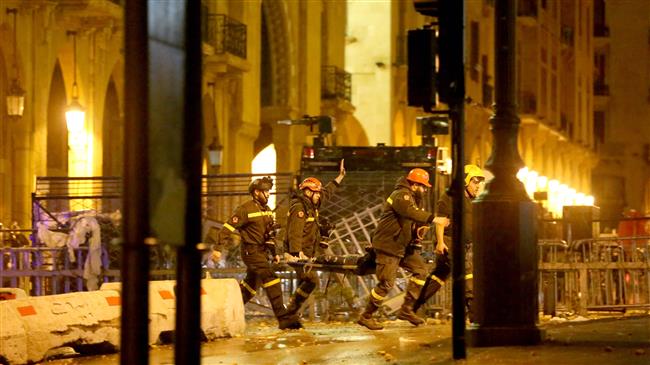Lebanese security forces have clashed with protesters whose once peaceful protests have increasingly turned violent after about three months of unrest.

Demonstrators hurled rocks, fireworks and other projectiles at security forces who responded by firing teargas, rubber bullets and using water cannon to disperse the crowds outside the parliament in Beirut Sunday.
The Lebanese Red Cross said it had treated 52 people at the scene of the clashes and rushed 38 to hospital.
The renewed clashes came a day after about 400 people were injured during the most violent weekend of protests in Beirut since Lebanese staged protests against the ruling elite in October.
The protesters chanted Not peaceful, not peaceful during the Sunday’s protests, contradicting peaceful, peaceful slogan that was heard in the early days of demonstrations.
Lebanon is being pushed to the brink of chaos and anarchy, Maha Yahya, director of the Carnegie Middle East Center.
This is a country that is spiraling economically downwards, you have increasing frustrations among a young population, and things could get out of hand very quickly. It’s only a matter of time.
Some protesters blamed instigators for the violence, saying they are working to radicalize the protests and push them toward violence.
There are instigators here, Elias, one of the protesters, said. It’s people who are not with the protests and want to give us a bad name.
Lebanon has been rocked by nationwide protests since October 17 against rising inflation and living costs as the government struggles to attract investment amid increasing economic hardships and a decreasing capital flow to the country.
The protests began when the government proposed imposing a tax on Whatsapp calls, along with other austerity measures.
The protesters blame the faltering economy on widespread corruption and abuse of privileges among politicians.
On October 29, Lebanon’s Prime Minister Saad Hariri submitted his resignation to President Michel Aoun.
Under the constitution, Hariri’s cabinet would stay on in a caretaker capacity until a new government is formed.
Prime Minister-designate Hassan Diab has vowed to form a government made up of independent specialists, who do not belong to political parties.
However, some observers are worried about efforts by foreign players to draw the country into chaos.
US Under Secretary of State for Political Affairs David Hale visited Beirut last month, just as Diab assumed office.
LINK: https://www.ansarpress.com/english/12971
TAGS:






























 online news tv
online news tv




